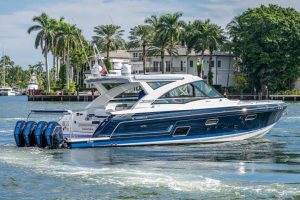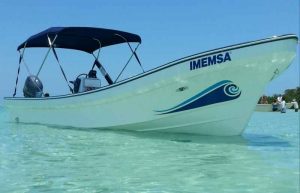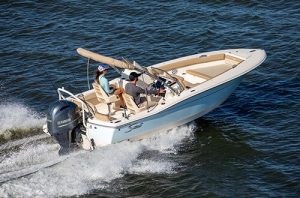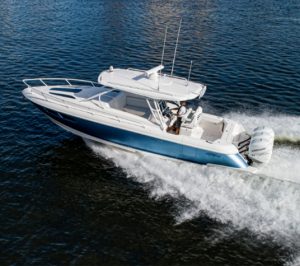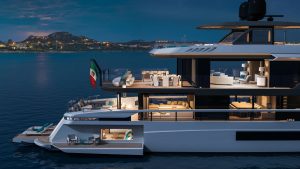Saltwater Fishing Boats Guide: Essential Tips for Your Perfect Vessel
When it comes to saltwater fishing, selecting the right boat is crucial for a successful and enjoyable experience. With a wide range of options available on the market, it can be overwhelming to determine the best choice for one's needs. This article is designed to provide insights into the world of saltwater fishing boats so that fishing enthusiasts can make informed decisions.
Whether the goal is offshore fishing for large gamefish or inshore fishing for smaller species, choosing the right saltwater fishing boat involves various factors, such as budget, boat size, and features. In the following sections, readers will be guided through the types of boats available, key features to look for, and tips for boat maintenance and storage.
From center console boats to walkaround cabin boats, each type offers unique advantages and characteristics that cater to different saltwater fishing styles. Understanding these distinctions will enable potential buyers to find the best match for their angling adventures and ensure a productive and enjoyable time on the water.
Types of Saltwater Fishing Boats
There are several types of saltwater fishing boats, each designed to suit specific fishing conditions and preferences. Below, we will highlight some common types of saltwater fishing boats and their key features.
Center Console: These boats are characterized by a central helm station, providing anglers with a 360-degree fishing platform. They are popular among avid anglers due to their versatility, efficient use of space, and ample storage for tackle and gear. Some common features of center console boats include T-tops for shade, rod holders, and live wells.
Offshore Sportfishing Boat: Ideal for big game fishing and long-distance trips, offshore sportfishing boats are typically larger and offer more powerful engines. They provide a stable platform in rough seas and often come equipped with amenities such as cabins, galleys, and restrooms. Key features can include outriggers, fish finders, and radar systems.
Bay Boat: These shallow-draft boats are designed for inshore fishing in bays and estuaries. They feature low freeboard for easy casting and often come equipped with trolling motors, poling platforms, and specialized rod holders for specific fishing techniques such as fly fishing or sight casting.
Skiff: Skiffs are small, flat-bottomed boats that provide easy maneuverability and access to shallow waters. They are typically simple in design and are an affordable option for anglers who fish in calm waters close to shore.
Walkaround: Combining the fishability of a center console with the comfort of a cabin, walkaround boats offer a compromise between the two. They feature a protected helm station and often include amenities such as overnight cabins and restrooms, while maintaining a fishable deck layout.
In summary, there is a variety of saltwater fishing boats available to suit the needs and preferences of every angler. When choosing the right boat, consider factors such as fishing location, weather conditions, target species, and personal amenities to ensure the best fit for your fishing adventures.
Key Features to Consider
When choosing a saltwater fishing boat, there are several key features to consider. These features can greatly impact the overall fishing experience and the boat's ability to withstand harsh marine environments. The following are some of the most important features to look for:
Hull Design: The hull design plays a crucial role in the boat's stability and performance in different water conditions. Deep-V hulls provide better rough water handling, while flat-bottomed or semi-V hulls are more suited for calmer waters and shallower fishing grounds.
Materials and Construction: Saltwater fishing boats need to be made of materials that can withstand the corrosive effects of saltwater. Fiberglass, aluminum, and high-quality marine-grade steel are popular choices for saltwater boats. Additionally, look for boats with quality construction techniques, such as welded aluminum, to ensure durability and longevity.
- Power and Range: Depending on the type of fishing and the distance from the shore, it is important to choose a boat with an appropriate engine and fuel capacity. More powerful engines and larger fuel tanks allow for greater range, enabling anglers to venture farther from the shore and explore deeper waters.
- Deck Space and Rod Storage: Ample deck space allows for comfortable movement and gear storage while fishing. Boats with built-in rod holders and storage compartments can help keep the deck organized and free of clutter.
- Fishing Amenities: Features such as live wells, fish boxes, bait stations, and washdown systems can greatly enhance the fishing experience. Consider looking for boats with these amenities to simplify your saltwater fishing excursions.
Electronics: Modern saltwater fishing boats often come equipped with advanced electronics systems to aid in navigation and fish-finding. GPS, chartplotter, radar, and fishfinder systems can make a significant difference in locating fish and ensuring a successful day on the water. Choose a boat with electronics that meet your needs and preferences.
Budget and Financing Options
When looking into saltwater fishing boats, it's essential to first establish a budget. A range of options exist, from affordable entry-level boats to luxury vessels with premium features. Considering factors such as boat type, new or pre-owned status, customization, and maintenance costs can help determine the right budget for each individual.
After setting a budget, it's essential to explore financing options. There are various ways to finance a saltwater fishing boat purchase, including:
- Boat loans: Similar to car loans, these can be obtained from banks, credit unions, or specialized marine lenders. Terms of boat loans can vary, with repayment periods typically spanning 10 to 20 years. Research different lenders and their rates before making a decision.
- Home Equity Loan: If a person has equity built up in their property, they can consider using it to finance their boat purchase. This option may offer lower interest rates and tax-deductible interest. It's important to weigh the pros and cons, as placing a home as collateral bears risk.
- Personal loan: Some individuals may choose to use a personal loan to fund their boat purchase. Interest rates for personal loans can be higher than other options, so thorough research is essential to find the best deals.
- Leasing: For those not ready to commit to full ownership, leasing a saltwater fishing boat is an alternative. This option allows usage for a specified period, typically requiring a down payment and monthly fees. At the lease's end, there may be an option to purchase the boat or switch to a different model.
Before settling on a budget and financing option, it's crucial to consider ongoing expenses associated with saltwater fishing boats. These can include insurance, maintenance, storage, and fuel costs. Accounting for these costs will lead to a more informed decision and a better overall ownership experience.
Popular Saltwater Fishing Boat Brands
The variety of saltwater fishing boat brands available in the market cater to various anglers' preferences and budgets. In this section, we will discuss some popular boat brands known for their reputation and quality of construction.
1. Boston Whaler: Boston Whaler has been producing high-quality boats since 1958. They are well-known for their 'Unsinkable Legend' status, providing reliability and safety with their foam-filled hulls. Their boats range from 11 to 42 feet, catering to various fishing styles and personal preferences.
2. Grady-White: Founded in 1959, Grady-White is renowned for producing reliable and comfortable fishing boats. The brand offers a variety of boats, such as center consoles, dual consoles, walkaround cabins, and express cabins, making their vessels suitable for different fishing needs.
3. Yellowfin: Yellowfin is a popular brand among tournament anglers due to their high-performance and meticulously engineered boats. Known for their speed and agility, Yellowfin boats are ideal for chasing big game fish in saltwater conditions.
4. Contender: Contender has been in the market since 1984, offering a line-up of customized boats that meet different anglers' requirements. The brand is highly respected for its rugged boat construction and exceptional performance at high speeds.
5. Pursuit: Pursuit is known for producing versatile boats that can be used for fishing and leisure activities. The brand offers a range of models including offshore, center console, sport, and dual console boats, making it appealing to both novice and experienced anglers.
These are just a few of the many reputable saltwater fishing boat brands available. Before making a purchase, anglers should carefully assess their fishing requirements and budgets as well as consider factors such as hull design, engine types, and onboard amenities.
Maintenance and Storage
Maintaining a saltwater fishing boat is crucial for its longevity and performance. Regular upkeep helps prevent corrosion, wear, and tear that can occur when exposed to harsh marine environments. Here are some essential maintenance tasks:
- Clean the boat with soapy water and a soft brush, followed by rinsing it thoroughly.
- Protect the gel coat using a marine wax to combat salt, sun, and water damage.
- Inspect and change anodes regularly to protect the boat's metal components from corrosion.
- Check and maintain the engine, bilge pumps, electrical system, and all other essential components periodically.
- Inspect and lubricate moving parts, such as outboard motors, hinges, and winches at regular intervals.
Proper storage is also vital for saltwater fishing boats. When not in use, store the boat in a clean, dry location, shielding it from the elements. The following tips can aid in proper boat storage:
- When possible, store the boat on a trailer or lift in a secure location, such as a shed, garage, or indoor facility.
- Consider shrink-wrapping the boat to protect from dirt, pests, and moisture during longer storage periods.
- Remove outboard engines or lower units to prevent theft and damage from fluctuating weather conditions.
- Place desiccants, such as silica gel packets, inside the boat to combat moisture accumulation.
- Regularly inspect the boat during storage to ensure its security and identify potential issues.
Following these maintenance and storage guidelines will ensure the boat remains in optimal condition, maximizing its lifespan and ensuring a great fishing experience.
Safety Tips and Equipment
When embarking on a saltwater fishing adventure, safety should always be a top priority. To ensure a secure and enjoyable experience, let's discuss some fundamental safety tips and essential equipment to keep in mind.
First and foremost, always check your local weather conditions before setting out, as rapid changes in weather can lead to dangerous situations on the water. It is best to be prepared by having a VHF radio on board to receive marine weather forecasts and emergency alerts.
Next, follow these safety tips:
- Wear a properly fitted life jacket at all times.
- Keep flares, signal mirrors, and other visual distress signals on board.
- Avoid overloading your boat and ensure proper weight distribution.
- Always share your float plan with someone onshore, including your destination and an estimated return time.
In addition to following these recommendations, having essential safety equipment on board will increase your preparedness in case of an emergency:
| Equipment | Purpose |
|---|---|
| Fire extinguisher | To address potential fires on board. |
| First-aid kit | For treating minor injuries and emergencies. |
| Throwable flotation device | A quick means of providing assistance to someone who falls overboard. |
| Marine whistle | A loud, distinct signaling device for attracting attention during emergencies. |
By adhering to these safety tips and ensuring that necessary equipment is onboard, anglers can focus on the excitement and joy of saltwater fishing while maintaining a safe environment.
Legal Requirements and Licensing
When it comes to saltwater fishing, there are specific legal requirements and licensing regulations that must be followed. Every location has its own set of rules and guidelines for individuals looking to partake in recreational or commercial fishing activities.
First and foremost, individuals must possess a valid fishing license for the appropriate region. In most areas, both non-residents and residents can obtain a saltwater fishing license, available either on a temporary or annual basis. These licenses can usually be purchased online, at state wildlife offices, or at various authorized retailers.
Furthermore, some regions may require specific permits for certain types of saltwater fishing, such as targeting specific species or engaging in certain fishing practices. In line with this, compliance with size and catch limits is of utmost importance. These limits often vary depending on the season and the targeted species. To stay informed about current regulations, it is vital to regularly check official governmental websites or consult with local authorities.
Additionally, many states have established marine protected areas (MPAs) where fishing is either restricted or prohibited. These areas aim to conserve and protect marine ecosystems and their inhabitants. Boaters and anglers are expected to familiarize themselves with the boundaries of these zones to avoid violations.
Finally, when using a saltwater fishing boat, one must adhere to the required safety regulations, such as carrying necessary emergency equipment like life jackets, flares, and communication devices. Boat registration and titles are also mandatory in many jurisdictions.
By understanding and complying with the legal requirements and licensing regulations associated with saltwater fishing, anglers can contribute to the conservation and sustainability of marine resources and ecosystems for future generations.
Top Saltwater Fishing Destinations
When it comes to saltwater fishing, there are a few destinations that stand out for their variety of species, stunning surroundings, and top-notch facilities. Here are some of the top saltwater fishing destinations worth considering for your next fishing adventure:
- Florida Keys, United States: The Florida Keys provide a diverse range of fishing options, including flats fishing for bonefish and tarpon, deep-sea fishing for marlin and sailfish, and reef fishing for grouper and snapper.
- Cabo San Lucas, Mexico: Known for its superb marlin fishing, Cabo San Lucas offers anglers the chance to target blue, black, and striped marlin, as well as other pelagic species like tuna and dorado.
- Gold Coast, Australia: The Gold Coast is home to some of the best game fishing in the world. Anglers can target black marlin, blue marlin, sailfish, wahoo, and yellowfin tuna in these waters.
- Cairns, Australia: Another Australian hotspot, Cairns is known for its giant black marlin fishing, with numerous world records having been set in these waters.
- Costa Rica: With both the Caribbean and Pacific coasts, Costa Rica offers a range of fishing opportunities, including inshore fishing for roosterfish and snook or offshore fishing for marlin, sailfish, and tuna.
In addition to these popular destinations, there are many other lesser-known saltwater fishing spots around the globe. Some of these include:
| Location | Notable Species |
|---|---|
| Andaman Islands, India | Marlin, sailfish, dogtooth tuna |
| Ascension Island, South Atlantic | Blue marlin, yellowfin tuna |
| Panama, Central America | Black marlin, roosterfish, dorado |
| Seychelles, Indian Ocean | Sailfish, giant trevally, dogtooth tuna |
While some destinations may be more famous than others, each of these locations offers unique experiences and opportunities for saltwater fishing enthusiasts. It's important to research and plan your trip carefully to ensure the best possible experience.
Conclusion
In this Saltwater Fishing boats guide, various types of boats have been examined and their unique features highlighted. The choice of a suitable fishing boat largely depends on the primary activities and preferences of each individual angler.
Some important factors to consider when choosing the ideal boat include available budget, desired level of comfort, potential fishing locations, and target species. Careful consideration of these factors will help anglers find the boat that best complements their needs.
Remember to prioritize safety and maintenance when making a decision. A well-maintained boat can provide years of reliable service and enjoyable fishing expeditions.
It is our hope that this guide serves as a valuable resource and contributes to the satisfaction and success of both seasoned and novice saltwater anglers alike.

